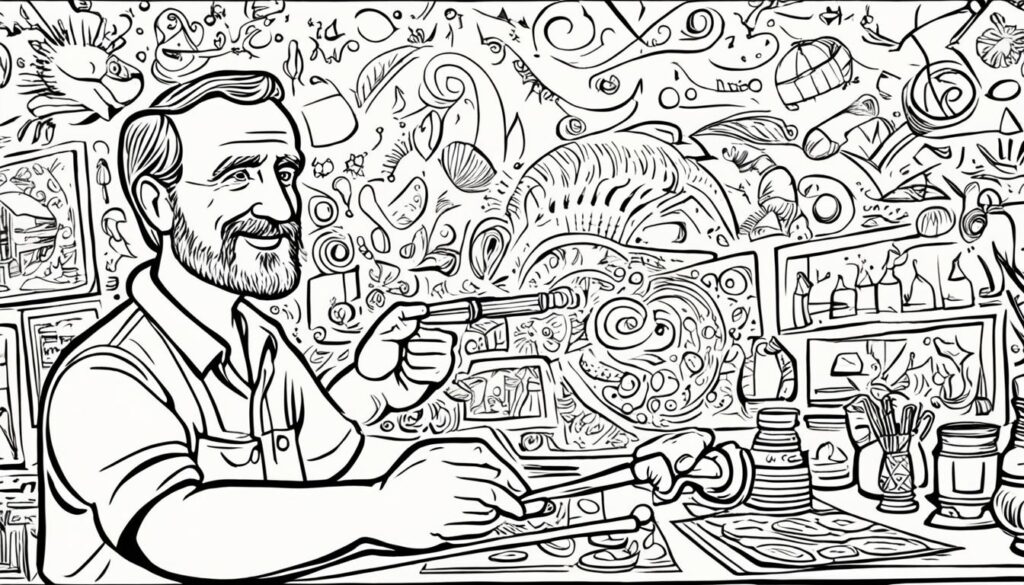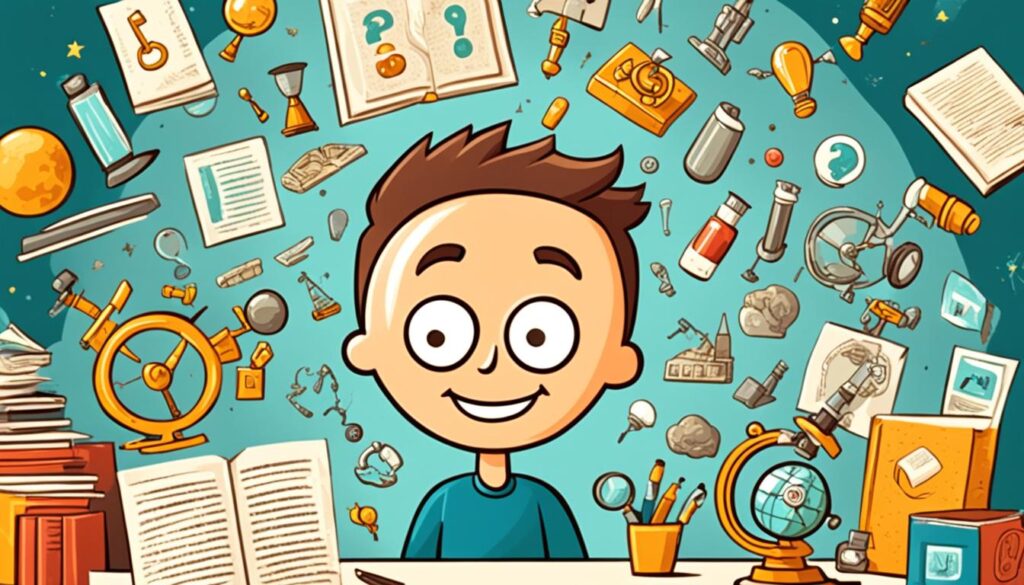Do you remember the last time you felt truly curious?
Think back to when you discovered something new. Remember the excitement and the need to know more. Curiosity is a strong force. It can change your life in amazing ways.
As kids, we were full of questions and loved exploring. But as adults, sometimes we lose that excitement. We stick to what we know instead of discovering new things.
Yet, if we keep being curious, it can do wonders for us. People who are really curious have habits that help them shine. They reach their highest potential because of these habits.
One habit is they really know themselves1. They think about their lives and learn about their own strengths and weaknesses. This helps them make better choices and be true to themselves.
They also love to get better at what they do2. Curious folks believe in growing and learning all the time. They take on new challenges and push themselves.
They make strong connections with others3, too. They’re open and kind, and they really listen. This makes their lives richer and builds community.
Their curiosity also helps them face fear1. They see scary things as chances to grow. Curiosity gives them the courage to try new things.
They are also very creative3. They welcome new ideas and think outside the box. This creativity leads to new discoveries and solutions.
Besides, they are always asking questions3. They know questions lead to adventures and learning. This helps them challenge the usual and learn more.
They’re also okay with learning out in the open1. They don’t mind making mistakes. Sharing what they learn helps everyone grow together.
They love exploring the in-between3. They’re drawn to where different ideas meet. This helps them find new ways of thinking and creating.
Finally, they’re great at linking seemingly unrelated things1. They see patterns others don’t. This skill helps them come up with unique solutions.
Key Takeaways:
- Curiosity can truly change your life.
- Curious people have habits like knowing themselves, learning constantly, making friends, facing fears, being creative, asking questions, learning openly, exploring the unknown, and linking different ideas.
- These habits can help you grow and discover more about yourself.
- Anyone can be curious if they’re willing to step into the unknown.
- Start being more curious today and see how it can help you in life.
Greater Self-Understanding
Curiosity helps us know ourselves better. By looking into our values, desires, and fears, we can choose wisely and live fully. Without it, we might just go through the motions, feeling disconnected. Embracing curiosity, we actively shape our lives and find our true selves.
Research shows that only 52% of workers are urged to be curious at their jobs. Yet, 83% of leaders say curiosity is key4. A study found curiosity is less valued than communication and commitment in the office. Only 5% see it as important4. This shows the need to nurture curiosity for personal growth.
Kids ask about 300 questions daily at 5 years old. But by high school, they hardly ask big questions4. This shows we must keep our curiosity alive through life to keep learning and growing.
Curious people are often more valued at work. They handle uncertainty well, show positive emotions, think differently, and are open4. These traits are great for personal growth and doing well at work.
Understanding curiosity’s various aspects can also help us know ourselves better. These include joyous exploration and the need for information4. By exploring these, we learn about what interests us and where we can grow.
Curiosity also benefits our mental health. It’s linked to more happiness, less anxiety, better life satisfaction, and well-being4. By being curious, we understand ourselves more deeply and find greater happiness.
Curious workers adapt faster, seek knowledge, ask deep questions, and tackle tough tasks4. This approach to learning and improvement leads to better self-understanding and personal growth.
In conclusion, knowing ourselves is key to living well. Curiosity lets us explore our inner world, making better choices and fulfilling our potential. Still, it’s important for workplaces to encourage curiosity. This helps everyone grow and develop personally.
More Motivation
Curiosity goes beyond just wanting to know more; it’s a key motivator that pushes you towards your dreams. When something captures your interest, you delve deeper, eager to learn and understand more. This kind of motivation fires up the brain’s learning and reward pathways, making you more determined5.
Being naturally curious makes you view challenges as chances to grow and learn. You believe that with effort, you can tackle any obstacle. Curiosity-driven motivation paves the way for significant achievements and personal development5.
Furthermore, curiosity fuels a constant thirst for knowledge and mastery in your field of interest. Those deeply interested in a topic never stop exploring and aiming for a deeper understanding. Their ceaseless curiosity drives them towards becoming experts5.
To boost your motivation through curiosity, start by welcoming your eagerness to learn and seeking out new experiences. Surround yourself with people who love learning; their passion will inspire yours6. Focus on the present when learning or doing tasks. Studies show this increases learning efficiency and motivation6. Embrace setbacks as opportunities to advance, using curiosity to fuel your journey towards personal and career growth56.
The Power of Curiosity in Motivation
Curiosity isn’t just casual interest; it’s a dynamic force driving you to success. By fostering curiosity, you unlock your potential and achieve great things. Let it lead you on a journey of growth and self-discovery.
Mastery in What You Do
Curiosity fuels our desire to get really good at things. It kindles a fire in us to dive deep into our interests. With a strong urge to learn more, we start on a path to become masters in our field.
Mastery isn’t just for a few. It’s open to all7. This journey isn’t about how smart someone is. It’s more about wanting to learn and keep getting better7. Your curiosity, hard work, and constant practice can lead you to the top of your area7.
The road to reaching mastery has three parts: student, practitioner, and master7. As a student, you dive into the basics of your chosen field7. You learn a lot by watching and soaking up knowledge during this phase7.
Then, as a practitioner, you start to use what you’ve learned. You practice a lot and try new things7. Finally, as a master, you’ve made it. You’re a leader in your craft and guide others on their journey7. Remember, reaching mastery is a continual journey, requiring effort and discipline every step of the way7.
An ideal apprenticeship shapes not only your skills but also your mind and character7. This process builds discipline and resilience. It includes learning by watching, skill-building through practice, and innovating through trial and error7.
Mastering your craft is a life-long journey7. It’s about always striving to be better. This path asks for focus and a strong love for learning7. By staying curious and dedicated, you can achieve great things.
Keys to Mastery
| Keys to Mastery | Connection with personal inclination | Dedication and discipline |
|---|---|---|
| Description | Acknowledging the importance of aligning your chosen field with your personal interests and strengths7 | Embracing a mindset of dedication, perseverance, and continuous improvement7 |
| Impact | Ensures a deep and meaningful connection to your work, driving intrinsic motivation and fulfillment7 | Forms the bedrock for consistent growth and the pursuit of mastery7 |
With curiosity and hard work, becoming a master is possible for anyone7. Cultivate your curiosity and match it with what you love. You’ll find your life’s purpose and start a fulfilling quest towards mastery7. Curiosity is a key ingredient. It helps you discover your true potential and leave a mark through your work.

Deeper Connections
Curiosity makes it easier to really connect with others. When you’re curious, you learn more about people’s lives and stories. This makes your connection with them stronger and enriches your life too.
Carl Rogers, a famous psychologist, talked about how important understanding is in relationships. With curiosity, we can build deeper connections with the people around us.
Since the early 2000s, research shows curiosity is key in therapy for both the therapist and the patient8. Todd Kashdan describes five parts of curiosity: joyous exploration, desire for new knowledge, being curious about others, being able to handle stress, and seeking new experiences8. Studies also show that curiosity can make us happier, less anxious, and improve our mental health8. These benefits help us connect deeply with others since curiosity increases emotional closeness, empathy, and understanding8.
Being curious also helps fight the increasing social anxiety among young people. It improves work, learning, and your overall happiness9. Interesting research found that talking to strangers can make your daily commute better. This was published by the Journal of Experimental Psychology9. This shows how curiosity can help us make connections and feel less lonely or isolated.
We naturally want to feel like we belong, a feeling that comes from our need to survive9. Even with modern technology, we still want this connection9. By being curious and reaching out, we can meet different people. This expands our views and helps us form deeper bonds with others9.
Benefits of Curiosity in Building Deeper Connections
| Benefits | Description |
|---|---|
| Enhanced Relational Intimacy | Curiosity leads to a deeper understanding of others, building closer relationships. |
| Access to Empathy | Curiosity increases empathy, making it easier to connect and understand others. |
| Combatting Isolation | By fostering connections, curiosity helps us fight feelings of loneliness. |
| Diverse Perspective | Engaging with a variety of individuals broadens our perspective through curiosity. |
Curiosity is a powerful tool for connecting with others. It helps us build strong relationships, understand people better, and feel a sense of belonging. By being curious, we can form deeper bonds that improve our life in many ways.”>
The Ability to Overcome Fear
Curiosity is a powerful tool against fear. It encourages us to try new things. Channeling curiosity helps face fears, leading to growth and discovery.
Leon Lederman, noted physicist, saw kids as natural scientists10. Their curiosity helps them learn and overcome fears.
Psychologist Jordan Litman divided curiosity into two types: interest and deprivation10. Interest drives us to learn more. Deprivation curiosity comes from wanting to know what we don’t know. Both types push us to explore and face fears.
Some creatures, like sharks and lobsters, grow all their lives10. They are always exploring, driven by curiosity.
TV shows use cliffhangers to spark our curiosity10. They make us want to keep watching. This shows how curiosity helps us face the fear of missing out.
Curiosity ties to our brain’s reward system10. When curious, our brain releases dopamine. This feels good and motivates us to seek new experiences, even scary ones.
Sea slugs show how curiosity helps in learning10. They adapt to changes by being curious. This overcomes fear.
Eric Kandel found how sea slugs’ curiosity aids learning10. His work shows how seeking knowledge can lead to great discoveries.
Eating triggers dopamine in our brains, too10. This mechanism, fueled by curiosity, is vital for survival. It helps us confront and beat fear.
Embracing Fear Through Curiosity
Letting curiosity lead can conquer fear. It drives us to unknown areas, pushing boundaries. Curiosity is crucial for overcoming fears and living fully.

More Creativity
Curiosity and creativity go hand in hand. Together, they drive progress and break new ground. When you let yourself be curious, you learn new things, powering creative thoughts. This mindset makes you question and explore, linking different ideas.
Many studies show that curiosity fuels creativity. Every child starts life eager to discover and learn11. Cultivating this trait keeps people of all ages engaged and happy. Life becomes an exciting journey of discovery11.
At work, even where creativity seems limited, curiosity is crucial. An article in the Harvard Business Review explains this well. It says curiosity leads to success. Yet, many workplaces don’t encourage it enough12. Francesco Gina shares five ways to foster creativity at work and in schools12.
The impact of curiosity isn’t just for work. It enriches learning and creativity in all aspects of life13. It leads to creative thinking and better self-understanding13. Being open to new experiences often means being more creative. This is shown through how we reflect and pay attention13. Scientists have found that the unconscious mind also plays a role in creativity13. Curiosity sparks intuition, which is key for creative and social interactions13. Creative people have a special skill in using their brains in unique ways13.
To unlock your creative power, nurture your curiosity every day. Seek out new things, question the usual, and see each day as a chance to grow. By adding curiosity to your life, you’ll find inspiring ideas and improve your creativity.

Seeking Liminal Spaces
People who are curious love liminal spaces. These are times of change that help us grow. They’re full of curiosity and not knowing, which is perfect for finding out who we are and coming up with new ideas. By looking for these spaces, we open ourselves to growing and seeing new opportunities.
Being curious is something we’re all born with. It’s seen in babies and grows as we get older14. Curious folks are ready to take risks and dive into the unknown. This leads to exciting and rewarding adventures14.
In these special spaces, people connect different ideas to find unique answers14. They ask lots of questions to keep learning and growing14. New interests keep curious minds busy, leading to more exploration and growth14.
Curious people question what most take for granted. They look deeper, expanding their view of the world and others14. They listen carefully, trying to see things from other perspectives14. When things get tough, they are gentle with themselves. They see life’s unpredictable nature as something positive14.
Some say curiosity comes from our genes, like the DRD4-7R gene14. But most experts believe we can all learn to be more curious, no matter our DNA14.
Curiosity is also important in how we connect with people. There are five known love languages—spending time together, giving gifts, doing kind acts, saying supportive words, and touching. Yet, not many talk about the love language of curiosity15. For some, like the writer, curiosity is a key way to grow and deepen relationships15.
Hailey Magee has guided over 100 clients to stop people-pleasing and create healthy boundaries15. Her advice is about being true to yourself, finding freedom inside, and sharing your curiosity in relationships15. When we express our needs, we build better connections15.
Searching for liminal spaces is a core trait of the curious. By being okay with not knowing and venturing into the unknown, we unlock growth, creativity, and stronger bonds with others1415.
Forming Connections Between Growing Ideas
People with curious minds are great at making connections between ideas. They think in a networked way, spotting patterns and links that aren’t obvious. Curious people look at ideas from all angles, finding new solutions and insights. This helps them spark creativity and solve problems well.
About 15 years back, the person who wrote “Surprising Habits of Highly Curious People That Will Change Your Life” lost 40 pounds16.They did this by really focusing on their goal. It’s tough to change, but with dedication, big changes are possible.
Being curious helps us understand the world better. It pushes us to learn from various areas. This way, we can see how different ideas connect. Such connections lead to new ideas and ways of thinking, which improve our problem-solving skills.
“The human mind is a networked system of thoughts, ideas, and experiences. Curiosity makes these connections stronger, boosting creativity and our understanding of the world.”
To make connections between ideas, we look for information everywhere. We learn from different fields. This mix of knowledge helps us come up with brand new ideas and solutions.
Duke University found that habits shape about 40% of our daily actions17.This underlines the need to develop habits that fuel curiosity and open-minded thinking. By doing so, we get better at linking different ideas.
Benefits of Forming Connections Between Ideas
Enhanced Creativity: Linking ideas from different areas leads to fresh problem-solving approaches. This sparks innovation and creative discoveries18.
Improved Critical Thinking: By connecting ideas, we can look at information from several viewpoints. This gives us deeper insights and a clearer understanding of difficult topics18.
Expanded Knowledge: Thinking in a networked way lets us use a wider range of knowledge and experiences. This enriches our understanding of the world and boosts our intellect18.
Enhanced Decision-Making: Connecting ideas helps us see things in a more complete way. This allows us to make better decisions based on a fuller understanding of the situation18.
| Benefits of Forming Connections Between Ideas | References |
|---|---|
| Enhanced Creativity | 18 |
| Improved Critical Thinking | 18 |
| Expanded Knowledge | 18 |
| Enhanced Decision-Making | 18 |
We can get better at linking ideas. Just be curious – read, explore cultures, and try new things. This helps us think in a networked way and make new connections. By seeking different views and questioning what we think we know, we grow our knowledge. And we tap the power of networked thinking.

Asking Questions
Being curious is part of who we are. We learn and grow by seeking new knowledge. Asking questions is a great way to show our curiosity.
Asking questions means you are on a quest for understanding. It shows you want to learn more about everything around you. By asking, you discover new ideas and gain different views.

The Power of Asking Questions
Asking questions helps you grow personally and professionally. You go deeper into topics and uncover important insights. This often challenges what we think we know.
Questions keep your curiosity alive. They encourage us to challenge norms and think of new solutions.
The Benefits of Cultivating Curiosity through Questions
Being curious by asking questions has many benefits. They can positively change your life. Here are some:
- Gain Greater Self-Understanding19
- Find Motivation and Purpose19
- Master Skills and Knowledge19
- Create Deeper Connections19
- Overcome Fear and Limitations19
- Unlock Creativity19
- Explore Liminal Spaces20
- Form Connections between Ideas20
- Foster Continuous Learning and Development21
Asking questions starts a journey of growth and discovery. It builds a love for learning that keeps you seeking new discoveries. Questions spark learning, understanding, and seeing the world in new ways.
The Impact of Asking Questions
“The important thing is not to stop questioning. Curiosity has its own reason for existing.”
Albert Einstein believed in curiosity’s power through asking questions. It’s how we learn and connect ideas. Questions challenge us and open up new possibilities.
By being curious and asking questions, we not only learn more but also inspire others. This builds a culture of learning and creating new ideas.
The Gift of Curiosity
Curiosity is a wonderful gift. It pushes us to keep learning and finding new things. Asking questions uses curiosity’s power for opening doors to new knowledge.
So, cherish your curiosity and keep asking questions. Let it lead you on a journey of constant learning and growth.
| Curiosity | Questions | Learning |
|---|---|---|
| Curiosity leads to Awareness of the Unknown21 | Asking Questions Fosters Continuous Learning and Growth1921 | Questions Serve as the Starting Point for the Learning Process21 |
| Curiosity Overcomes Fear and Limitations19 | Questions Ignite Curiosity and Foster Innovation20 | Curiosity and Questions Cultivate Creativity21 |
| Curiosity Drives Personal Growth and Achievement19 | Questions Spark Meaningful Conversations and Connections19 | Curiosity Leads to a Deeper Understanding of Ourselves and the World19 |
Learning in Public
Curiosity leads to a life full of growth and learning. People who are very curious know how important it is to learn publicly. They love to gain new knowledge and share what they find with everyone. This way, they help build a world where everyone is curious and loves to learn.
Research in the Neuron journal shows how curiosity affects our brains. In a study, 19 people checked out over 100 trivia questions. The aim was to see how curious they were22. Their brains lit up in pleasure and reward areas when they were really interested22. The hippocampus, which helps make memories, also became more active22.
Being curious also makes us remember things better. When quizzed later, the curious ones recalled more correct answers22. They were even better at remembering boring details. So, curiosity is key for learning more effectively and growing personally.
But sometimes, our school system might not help curiosity grow. It can make curiosity less exciting with strict lessons and early tests23. Reports show that kids start to lose interest in school as young as in first grade. This is because of standardized tests, big classes, and not enough resources23. As they move up in school, students might stop asking questions to avoid being seen badly23.
Despite these hurdles, people who are curious know it’s vital for growth. They always look for chances to learn and share. They move beyond what regular education offers. By being open and willing to be vulnerable, they connect deeply with others and encourage them to be curious too.
A curious culture leads to endless learning, empowers us, and helps us all grow together. Curious folks always seek new knowledge, consider different views, and find fresh insights. By sharing what they learn, they encourage more people to be curious. Together, we can make a world filled with curiosity and knowledge.
Conclusion
Making curiosity a key part of your life can change your life. Start asking questions and exploring new ideas to tap into your full potential. This practice can lead to personal growth and stronger connections with those around you. Curiosity fuels your drive to learn, be creative, and tackle fears.
It opens you up to the world’s wonders and endless possibilities. So, light the fire of curiosity within you. By doing so, watch as your life transforms for the better.
Many studies highlight the big benefits of being curious. For instance, a 1996 research found that curious older adults were more likely to live longer. They even accounted for age and health issues24. Curious individuals often have lower chances of getting hypertension and diabetes24. It also links to smarter kids, happier lives, and more satisfying relationships24.
Curiosity isn’t just good for your health and mind. It makes everyday life richer. Studies show it can lessen boredom and create stronger connections25. It leads to more happiness, better mental health, smarter problem-solving, and less aggression25. Being curious helps you understand others, grow personally, do better in school, and at work25. It even eases anxiety and increases dopamine, making you feel better25.
To be more curious, try doing what naturally curious people do. They prefer truth over personal beliefs and are open to new ideas. They listen more in conversations, find common ground, and navigate discussions positively26. Activities that spark curiosity, like exploring, reading, going to events, or taking quizzes, also help a lot25.
Embrace curiosity to start a rewarding journey full of discoveries. This path can be exciting and full of learning. Embracing curiosity is your ticket to a better life and reaching your highest potential.









